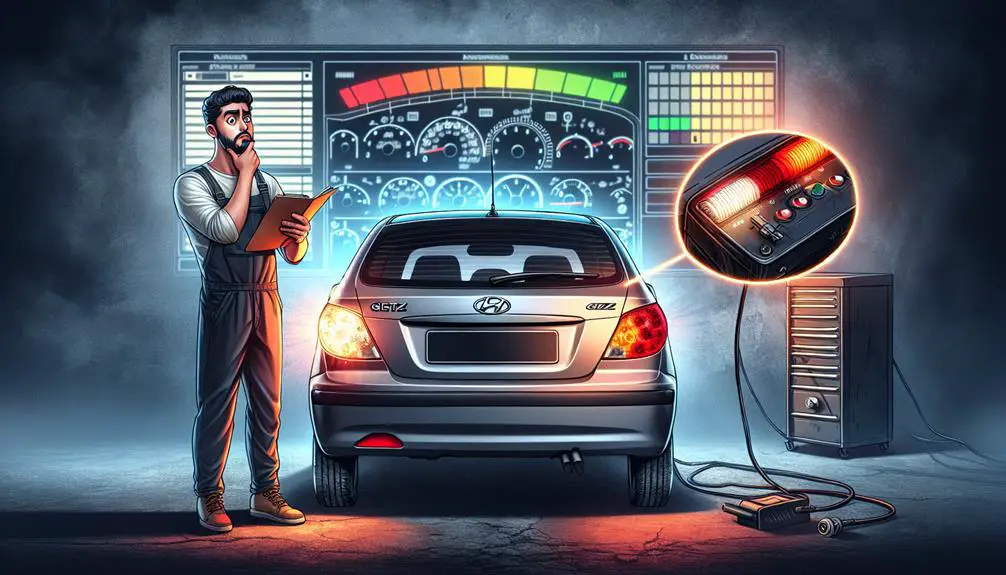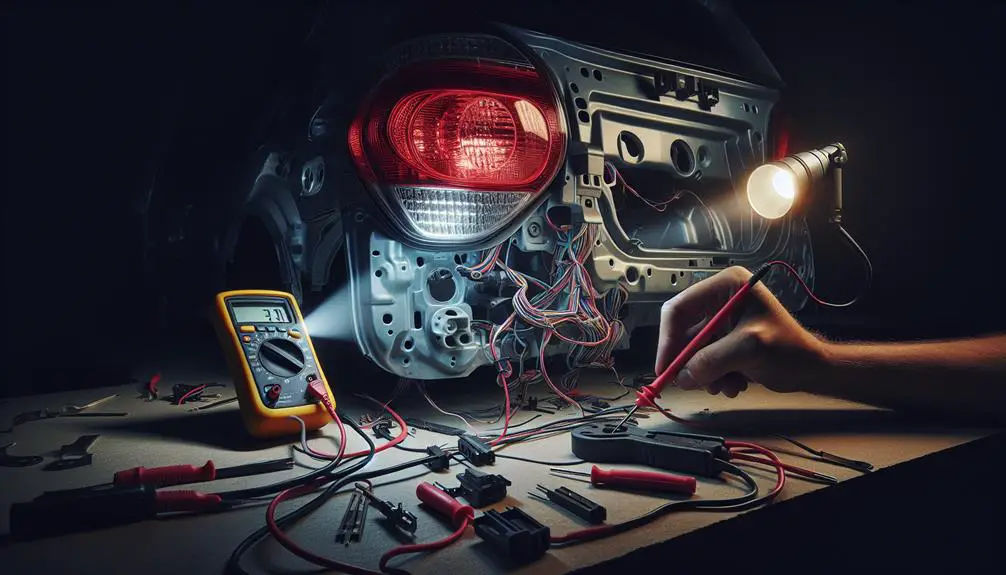Hyundai Getz brake lights not working can be fixed by checking the following:
- Fuse
- Bulbs
- Brake switch
- Wiring connections
Identifying the Issue

If you've noticed your Hyundai Getz's brake lights aren't lighting up, it's crucial to pinpoint the problem. Initially, you might think it's a simple bulb issue, but sometimes, the root cause can be a bit more complex. Here's how you can start troubleshooting.
Initially, check the brake light bulbs. You'd be surprised how often this is overlooked. To do this, you'll need to access the brake light housing from the trunk or by removing the light assembly. Once you're in, examine the bulbs for any signs of damage or filament breakage. If they're blown, replacing them should solve your issue.
However, if the bulbs look fine, your next step is to inspect the brake light sockets and wiring. Look for any signs of corrosion or damage. Corrosion can interrupt the circuit, preventing your brake lights from working. If you spot any, cleaning the contacts might get things back in order. But if the damage is severe, you might need to replace the sockets or wiring.
Lastly, don't forget about the brake light switch. This switch is activated when you press the brake pedal, signaling the brake lights to turn on. If it's faulty, your brake lights won't work. Locating the switch near the brake pedal, check for any signs of wear or damage. You might need a multimeter to test its functionality. If it's not working as it should, replacing the switch is your best bet.
Checking the Fuse
After checking the bulbs, sockets, and brake light switch, it's important to examine the fuse responsible for your Hyundai Getz's brake lights. Fuses are the silent protectors of your vehicle's electrical system, designed to blow and cut off the circuit if there's an overload, preventing further damage. Yet, this protective measure means that a simple blown fuse can leave you scratching your head over non-functioning brake lights.
Initially, you'll need to locate the fuse box. In most Hyundai Getz models, it's found under the dashboard on the driver's side or near the engine compartment. Your owner's manual will have a detailed diagram pointing you in the right direction. Once located, you're looking for a fuse labeled something akin to 'Stop Lights' or 'Brake Lights.' This will be your target.
Before you proceed, here's a concise list to create a vivid imagery of the process:
- *A small, plastic fuse puller tool*, usually found inside the fuse box itself, ready to assist in extracting the tiny culprit without much fuss.
- *A collection of colorful fuses*, each with a different amperage, looking like a miniature city skyline under the fuse box cover.
- *The culprit*, a tiny, translucent cube that, upon inspection, reveals a broken metal filament inside, the root cause of your brake light woes.
Using the fuse puller tool, gently remove the suspect fuse and inspect it. If the metal strip inside is broken, you've found your issue. Replace it with a new fuse of the same amperage, and you should see your brake lights spring back to life.
Inspecting the Bulbs

Before moving on to more complex issues, it's crucial to check the condition of your Hyundai Getz's brake light bulbs, as they might simply need replacing.
Initially, you'll need to access the brake light bulbs. Start by opening your Getz's trunk or hatch. Locate the brake light fixtures; they're usually accessible from inside the trunk, behind a protective cover. You might need a screwdriver or a similar tool to remove this cover, but many models allow you to pop it off with your hands.
Once you've gained access to the bulbs, carefully remove them from their sockets. You're looking for any signs of damage or wear. A blown bulb is usually obvious—it'll have a broken filament or black discoloration inside the glass. Alternatively, there's no visible damage, the bulb might still be the culprit. Bulbs can wear out over time and stop working without any external signs of failure.
If you find that one or more bulbs are indeed blown, you're in luck. Replacing a brake light bulb is straightforward and one of the easiest fixes you can do. Make sure you purchase the correct replacement bulb for your Getz model. When installing the new bulb, try not to touch the glass part with your bare fingers; the oil from your skin can shorten the bulb's lifespan. After securing the new bulb in its socket, replace the protective cover and test your brake lights.
This simple check can save you time and money. If your brake lights still aren't working after replacing the bulbs, then it's time to investigate further into the electrical system. But in many cases, a quick bulb swap is all it takes to get things working again.
Testing the Brake Switch
Having checked and replaced any faulty bulbs without resolving the brake light issue, it's time to test the brake switch on your Hyundai Getz. The brake switch is a vital component that triggers your brake lights when you press the brake pedal. If it's malfunctioning, your brake lights won't work, regardless of the bulbs being in perfect condition.
Here's how you can test the brake switch effectively:
- Locate the Brake Switch: It's usually found near the top of the brake pedal. You might need to lie on your back and look up under the dashboard to spot it. Remember, you're looking for a small device attached to a bracket that holds it in place against the pedal.
- Inspect Visually: Before diving into any testing, give it a visual inspection. Check for any obvious signs of damage or disconnection. Sometimes, the issue might be as simple as the switch being knocked out of position.
- Use a Multimeter: To test the functionality of the brake switch:
- Disconnect the switch from its connector.
- Set your multimeter to the continuity setting.
- Place each probe on the switch's terminals.
- Press the brake pedal. If the switch is working, the multimeter should show a change from no continuity to continuity.
If your multimeter doesn't show any change, it's likely that the brake switch is the culprit behind your brake light issues. Replacing it should get your brake lights back in working order. Remember, your safety on the road significantly depends on functioning brake lights.
Examining Wiring Connections

Moving on to the wiring connections, it's crucial to make sure they're intact and properly secured to avoid any brake light malfunctions. After you've checked the brake switch and confirmed it's in working order, the next step is to examine the wiring that connects to your Hyundai Getz's brake lights. This can be a bit tricky, but with patience, you'll manage.
Initially, you'll need to locate the wiring harness that leads to the brake lights. It's usually found in the trunk or along the car's rear frame. Look for any obvious signs of wear or damage, such as frayed wires or corrosion. These issues can interrupt the electrical current that's supposed to reach the brake lights.
Next, make sure all connections are tight and secure. Loose connections can cause intermittent or complete failure of the brake lights. If you're not sure how tight they should be, consult your Hyundai Getz's manual for guidance. Sometimes, simply unplugging and replugging the connectors can clean off minor corrosion and improve the connection.
If you've found damaged wires, you might need to splice in new sections or replace entire sections of wiring. This requires a bit more technical skill, so if you're not comfortable, it's best to seek help from a professional. Remember, messing up the wiring could lead to more electrical issues down the line.
To end, don't forget to check the ground connection for the brake lights. A poor ground can also lead to malfunctioning lights. It should be securely attached to the car's frame and free of rust or corrosion.
Conclusion
So, you've gone through the steps to troubleshoot your Hyundai Getz's brake lights issue. You've checked the fuse, inspected the bulbs, tested the brake switch, and examined the wiring connections.
If you've found and fixed the problem, great job! If they're still not working, it might be time to consult a professional. Remember, functioning brake lights are important for your safety and others on the road. Don't hesitate to get expert help to guarantee everything's in top shape.